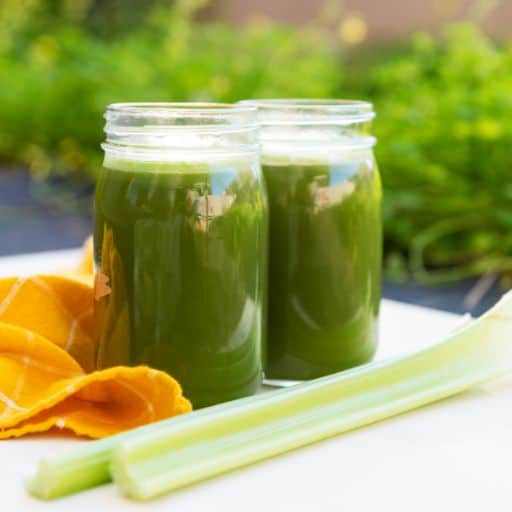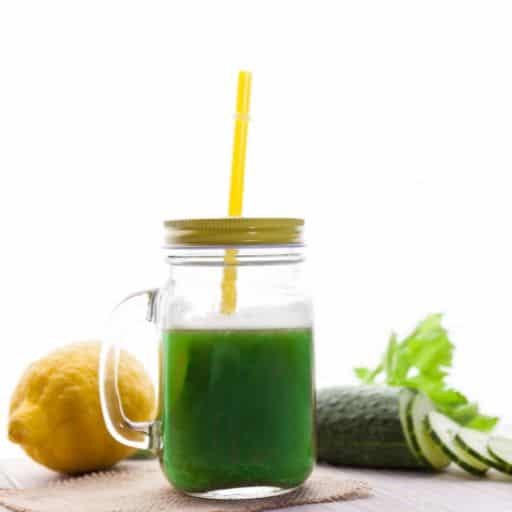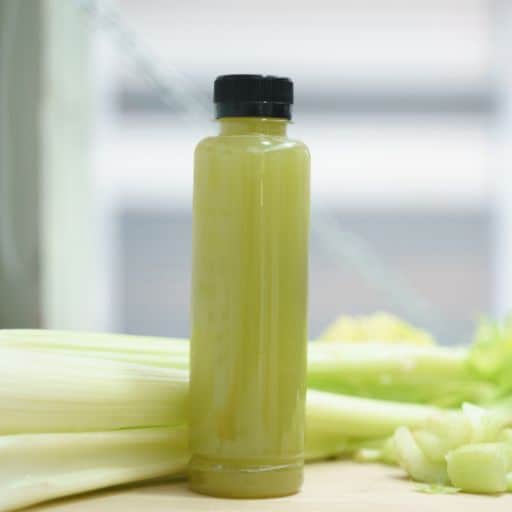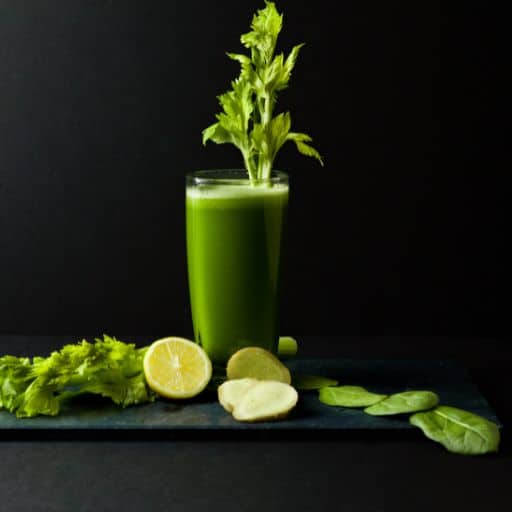Are you a fan of celery juice? You’re not alone! This green elixir has taken the health world by storm, promising many benefits. But here’s the catch: while celery juice may seem like a magical potion, it does have its downsides. Yes, you heard that right – negative side effects.
Before you guzzle down another glass, it’s crucial to understand that celery juice isn’t suitable for everyone. Despite its advantages, celery juicing can trigger adverse reactions in certain individuals. So what are these side effects? Let’s dive in and uncover the truth.
Celery juice can cause discomfort, such as bloating and digestive issues in some people. Moreover, excessive consumption might lead to an electrolyte imbalance due to its high potassium content. Knowing these potential drawbacks is important before jumping on the celery juice diet bandwagon.
While celery juice certainly offers health benefits for many individuals, it’s essential to approach it cautiously and consider whether it aligns with your specific needs and circumstances. So let’s explore the negative side effects further and make an informed decision about incorporating this popular beverage into our routines.
Understanding Safe Consumption Levels of Celery Juice:

Moderation is Key
Moderation is key. While celery juice has gained popularity as a superfood with numerous potential health benefits, consuming excessive amounts can have negative side effects. It’s important to find a balance and avoid going overboard.
Recommended Daily Intake
To ensure optimal safety, knowing the recommended daily intake of celery juice is crucial. While there isn’t an official standard serving size for celery juice, nutritionists suggest starting with around 8 to 16 ounces daily. This amount allows you to enjoy the potential benefits without overwhelming your system.
Potential Negative Side Effects
Consuming excessive amounts of celery juice can lead to unwanted consequences. Some individuals may experience digestive issues such as diarrhea or stomach discomfort when they consume large quantities of celery juice in one sitting.
Due to its diuretic properties, excessive consumption may increase urination frequency and lead to dehydration without adequate hydration.
Finding Your Balance
When incorporating celery juice into your daily routine, listen to your body and find what works best. Start by gradually introducing small amounts into your diet and observe how your body reacts. Pay attention to any signs of discomfort or adverse reactions.
Tips for Safe Consumption
Here are some tips for safely consuming celery juice:
- Start with smaller servings: Begin with around 8 ounces per day and see how your body responds before increasing the quantity.
- Hydrate adequately: Remember to drink enough water throughout the day alongside consuming celery juice.
- Monitor your digestion: Reduce the amount consumed if you experience digestive issues like diarrhea or stomach discomfort.
- Consider individual sensitivities: Some individuals may be more sensitive than others, so adjust accordingly based on personal tolerance levels.
Potential Side Effects of Drinking Too Much Celery Juice:

Electrolyte Imbalances
Believe it or not, too much celery juice can throw off your body’s delicate balance of electrolytes. Electrolytes are essential minerals that help regulate various bodily functions, including muscle contractions and nerve impulses. When you consume excessive amounts of celery juice, the high levels of potassium present in the vegetable may disrupt this balance and lead to electrolyte imbalances.
These imbalances can cause muscle weakness, irregular heartbeat, and even fatigue. So while celery is often touted as a healthy option for replenishing electrolytes, moderation is key to avoid potential disruptions.
Increased Sun Sensitivity? Yes, Really!
You might not expect it, but drinking copious amounts of celery juice could make you more sensitive to sunlight. This heightened sensitivity arises from a compound called psoralen, found naturally in celery. Psoralen makes your skin more susceptible to UV rays and increases the risk of sunburn.
So if you’ve been chugging down celery juice like there’s no tomorrow and planning a day out under the scorching sun without sunscreen protection—think again!
Exploring Allergies and Hypersensitivity Reactions to Celery Juice:

Allergic Reactions: Itching, Swelling, and More
Some individuals may experience allergic reactions like itching or swelling after consuming celery juice. While celery is a popular vegetable known for its health benefits, it can trigger allergies in certain people. These allergies occur when the immune system mistakenly identifies certain proteins in celery as harmful substances.
For those with known allergies or hypersensitivity, caution should be exercised when drinking celery juice. It’s important to pay attention to any symptoms that may arise after consumption. Allergic reactions can range from mild discomfort to more severe symptoms requiring medical attention.
The Symptoms of Celery Allergy
When someone with a celery allergy consumes celery juice, they may experience various symptoms. These can include:
- Itching: One of the most common signs of an allergic reaction is itching around the mouth or throat.
- Swelling: In some cases, swelling can occur in the lips, tongue, or face after consuming celery juice.
- Digestive Issues: Allergies to celery can manifest as digestive problems such as abdominal pain, diarrhea, or nausea.
- Respiratory Symptoms: Some individuals may develop respiratory symptoms like coughing, wheezing, or difficulty breathing.
- Skin Reactions: Skin rashes and hives are also possible indicators of a celery allergy.
If you experience any of these symptoms after consuming celery juice, it’s advisable to seek medical attention for proper diagnosis and guidance.
Interactions with Medications and Blood Thinners:

Drinking celery juice may have negative side effects when combined with certain medications and blood thinners. This is because celery contains natural compounds that can interact with these substances, potentially affecting their effectiveness or even posing health risks.
Certain medications can be affected by the chemicals present in celery juice. These interactions can alter how the medicine works in your body, leading to potential complications or reduced efficacy.
Inform your healthcare professional about your plans to consume celery juice so they can advise you accordingly.
Blood thinners, such as those prescribed for cardiovascular conditions, may also be impacted by celery juice consumption. Celery contains vitamins and other substances that can affect blood clotting and interfere with the mechanisms of these medications. Your doctor will better understand how celery juice might interact with your specific blood thinner and can provide guidance on whether it is safe for you to consume.
Celery Juice for Managing High Cholesterol and Blood Pressure:

Is Celery Juice Really Effective?
- Celery juice has become a natural remedy for managing high cholesterol and high blood pressure.
- While it may have some potential benefits, it is important to understand that relying solely on celery juice may not be sufficient for effectively managing these conditions.
- It is always recommended to consult with a healthcare professional before incorporating celery juice into your cholesterol or blood pressure management plan.
Understanding the Benefits:
- High Cholesterol Management:
- Celery contains compounds known as phthalides, which are believed to help lower cholesterol levels.
- These compounds work by reducing the production of LDL (bad) cholesterol in the liver.
- However, simply consuming celery juice alone may not be enough to impact cholesterol levels significantly. Other lifestyle changes should also be considered, such as a healthy diet and regular exercise.
- Blood Pressure Regulation:
- Celery is rich in potassium, which is vital in regulating blood pressure.
- Potassium helps counterbalance the negative effects of sodium by relaxing blood vessels and promoting proper fluid balance.
- Incorporating celery juice into your diet can potentially contribute to maintaining healthy blood pressure levels.
The Importance of Professional Guidance:
- While celery juice shows promise in managing high cholesterol and blood pressure, seeking guidance from a healthcare professional is crucial.
- They can assess your health needs and provide personalized recommendations based on your medical history and current condition.
- A healthcare professional can help create an overall plan that includes dietary adjustments, exercise routines, and potentially medication if necessary.
Low in Fiber, Low in Sugar: Nutritional Profile of Celery Juice:

Not the Best Source of Fiber
While celery juice has gained popularity for its potential health benefits, it is important to note that it is low in fiber. Celery juice may not be the best choice for individuals seeking a high-fiber diet. Fiber plays a crucial role in digestion and can help regulate bowel movements, lower cholesterol levels, and control blood sugar levels.
A Low-Sugar Option
One of the advantages of celery juice is its low sugar content. Unlike many sugary beverages that can wreak havoc on blood sugar levels, celery juice provides a refreshing alternative that won’t cause a spike in glucose. This makes it an appealing option for those watching their sugar intake or managing conditions like diabetes.
Understanding the Nutritional Composition
To determine whether celery juice suits your specific dietary needs, it’s essential to understand its nutritional composition. While it may lack significant fiber, celery juice still offers various nutrients that can contribute to overall health. It contains vitamins such as vitamin K and vitamin C and minerals like potassium and folate.
Considering Alternatives for Fiber Intake
If you’re concerned about getting enough fiber but still enjoy the benefits of drinking celery juice, there are alternatives to consider:
- Add other fruits or vegetables rich in fiber to your juicing routine.
- Include whole foods like beans, lentils, whole grains (such as quinoa or brown rice), and nuts/seeds as additional sources of dietary fiber.
- Incorporate leafy greens such as spinach or kale into your diet for added fiber.
The Antioxidant and Anti-inflammatory Properties of Celery Juice:
Celery juice has gained popularity in recent years for its potential health benefits. One of the reasons behind this is its antioxidant and anti-inflammatory properties. Let’s take a closer look at how celery juice can contribute to your overall well-being.
Antioxidants: Fighting Oxidative Stress
Celery contains antioxidants that are crucial in combating oxidative stress within the body. Oxidative stress occurs when an imbalance between free radicals and antioxidants leads to cellular damage. By incorporating celery juice into your diet, you can introduce these powerful antioxidants to help neutralize harmful free radicals.
Anti-inflammatory Effects: Soothing Inflammation
In addition to its antioxidant content, celery possesses anti-inflammatory properties that may offer potential health benefits. Chronic inflammation has been linked to various health conditions, such as heart disease, arthritis, and certain types of cancer. Consuming celery juice regularly may help reduce inflammation in the body due to the presence of plant compounds like luteolin.
Aiding Overall Well-being: The Power of Celery Juice
By harnessing the antioxidant and anti-inflammatory effects, celery juice can contribute significantly to your overall well-being. Here are some reasons why incorporating celery juice into your routine may be beneficial:
- Fighting oxidative stress: The antioxidants in celery juice help combat free radicals and protect cells from damage.
- Reducing inflammation: The anti-inflammatory properties present in celery can assist in soothing chronic inflammation.
- Supporting heart health: By reducing oxidative stress and inflammation, celery juice may promote cardiovascular health.
- Hydration: Celery is mostly water, making it a refreshing choice for staying hydrated throughout the day.
- Weight management: Celery is very low in calories and does not cause weight gain.
Juicing vs. Eating Celery: Which is Better?

The Fiber Factor
One of the main differences between juicing and eating it lies in the fiber content. Juicing celery removes its dietary fiber, leaving a refreshing and hydrating juice. On the other hand, consuming whole celery provides you with the benefits of dietary fiber.
Fiber plays a crucial role in our diet as it aids digestion, promotes feelings of fullness, and helps regulate blood sugar levels. When you juice celery, you eliminate most of its fiber content, impacting how your body processes the nutrients and affecting your overall digestion.
Individual Preferences and Nutritional Goals
Choosing between juicing or eating celery ultimately depends on your preferences and nutritional goals. Let’s take a closer look at the advantages and considerations of both options:
Juicing Celery
- Hydrating: Juicing celery allows you to hydrate your body due to its high water content quickly.
- Concentrated Nutrition: Celery juice contains concentrated vitamins, minerals, and antioxidants that are easily absorbed by your body.
- Empty Stomach Benefits: Many proponents of celery juice recommend consuming it on an empty stomach to maximize its potential benefits for digestion.
Eating Whole Celery
- Dietary Fiber: Consuming whole celery provides dietary fiber that aids digestion, promotes satiety, and supports overall gut health.
- Taste Variety: Eating whole celery allows you to enjoy its crunchy texture and mild flavor while incorporating it into various dishes or as a snack.
- Nutritional Pairings: Pairing celery with other foods like apples can create a delicious combination packed with additional nutrients.
Frequently Asked Questions
Can drinking too much celery juice cause stomach discomfort?
Yes, consuming excessive amounts of celery juice can lead to stomach discomfort, including bloating and diarrhea. It is recommended to start with small quantities and gradually increase your intake to assess your tolerance.
Can celery juice interact with my medications?
Celery juice may interact with certain medications, especially blood thinners. It is advisable to consult with your healthcare provider before incorporating celery juice into your diet if you are taking any medications.
Is it safe for pregnant women to drink celery juice?
While celery juice is generally considered safe during pregnancy, it is always best to consult a healthcare professional before making significant dietary changes or introducing new foods or beverages.
Can drinking celery juice help lower cholesterol levels?
Celery juice contains compounds that may contribute to managing high cholesterol levels. However, it should not be solely relied upon as the primary treatment for high cholesterol. A balanced diet and lifestyle modifications are essential for overall heart health.
Should I choose juicing or eating whole celery for maximum benefits?
Eating whole celery provides more fiber than juicing. However, juicing gives you concentrated nutrients. Both options are beneficial for your body.
Understanding the Negative Side Effects of Celery Juice:
In conclusion, being aware of the potential negative side effects of consuming celery juice is important. While celery juice offers various health benefits and is low in calories, it is crucial to understand safe consumption levels. Drinking excessive amounts of celery juice can lead to potential side effects such as digestive issues and electrolyte imbalances.
Some individuals may experience allergies or hypersensitivity reactions to celery juice, manifesting as skin rashes, itching, or difficulty breathing. It is essential to be cautious if you have a known allergy to celery or other related vegetables.
Furthermore, celery juice may interact with certain medications and blood thinners, potentially affecting their effectiveness. If you are taking any medications or have underlying health conditions, it is advisable to consult with your healthcare provider before incorporating large quantities of celery juice into your diet.
While there are numerous claims about the health benefits of celery juice, it is important not to fall for myths and misconceptions. Celery juice possesses antioxidant and anti-inflammatory properties that can contribute to your overall well-being. However, it should not be considered a magical cure-all for all ailments.
When deciding between juicing or eating celery, remember that consuming whole celery provides more fiber than juicing. Fiber plays a vital role in digestion and helps maintain healthy blood sugar levels.
To make an informed decision about incorporating celery juice into your routine, consider consulting with a nutritionist or registered dietitian who can provide personalized guidance based on your specific needs and health goals.
Remember that moderation is key when consuming any food or beverage. If you experience any adverse reactions after drinking celery juice or have concerns about its potential negative side effects, it is best to discontinue use and seek professional advice from a healthcare provider.
Citations:
celery allergy: https://www.nhs.uk/conditions/food-allergy/
antioxidant: https://www.ncbi.nlm.nih.gov/pmc/articles/PMC5871295/
Kooti W, Daraei N. A Review of the Antioxidant Activity of Celery ( Apium graveolens L). J Evid Based Complementary Altern Med. 2017 Oct;22(4):1029-1034. doi: 10.1177/2156587217717415. Epub 2017 Jul 13. PMID: 28701046; PMCID: PMC5871295.
cancer: https://www.ncbi.nlm.nih.gov/pmc/articles/PMC6357032/
Abotaleb M, Samuel SM, Varghese E, Varghese S, Kubatka P, Liskova A, Büsselberg D. Flavonoids in Cancer and Apoptosis. Cancers (Basel). 2018 Dec 28;11(1):28. doi: 10.3390/cancers11010028. PMID: 30597838; PMCID: PMC6357032.
luteolin: https://journals.plos.org/plosone/article?id=10.1371/journal.pone.0137106
Atsuko Nakayama ,Hiroyuki Morita ,Tomoko Nakao,Toshihiro Yamaguchi,Tomokazu Sumida,Yuichi Ikeda,Hidetoshi Kumagai,Yoshihiro Motozawa,Tsukasa Takahashi,Atsushi Imaizumi,Tadashi Hashimoto,Ryozo Nagai,Issei Komuro
Published: September 1, 2015
https://doi.org/10.1371/journal.pone.0137106


